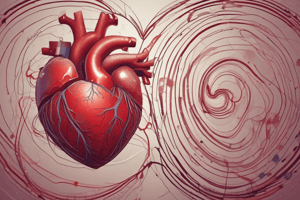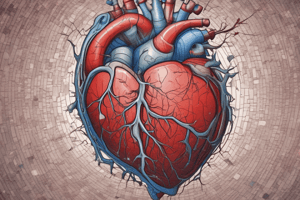Podcast
Questions and Answers
What is cardiac decompensation caused by?
What is cardiac decompensation caused by?
- A decrease in afterload
- An increase in preload
- Increased sympathetic activity
- A decrease in cardiac output (correct)
What is determined by the tone of the venous system?
What is determined by the tone of the venous system?
- Preload (correct)
- Cardiac output
- Heart rate
- Afterload
What is systolic dysfunction characterized by?
What is systolic dysfunction characterized by?
- Increased heart rate
- Inability to relax
- Decreased muscle strength (correct)
- Increased preload
What is diastolic dysfunction characterized by?
What is diastolic dysfunction characterized by?
What is the result of increased sympathetic activity in congestive heart failure?
What is the result of increased sympathetic activity in congestive heart failure?
What is the NYHA classification based on?
What is the NYHA classification based on?
What is the goal of drug treatment in milder cases of heart failure?
What is the goal of drug treatment in milder cases of heart failure?
What is the mechanism of action of diuretics in heart failure treatment?
What is the mechanism of action of diuretics in heart failure treatment?
What is the positive inotropic effect of digitalis preparations?
What is the positive inotropic effect of digitalis preparations?
What is a common side effect of digitalis preparations?
What is a common side effect of digitalis preparations?
What is the treatment of overdose of digitalis preparations?
What is the treatment of overdose of digitalis preparations?
What is the indication for Digibind?
What is the indication for Digibind?
Flashcards are hidden until you start studying
Study Notes
Congestive Heart Failure
- Cardial decompensation occurs due to a decrease in cardiac output (CO), leading to a deterioration of blood supply to tissues.
- Preload is determined by the tone of the venous system, while afterload is determined by the arterial system and peripheral resistance (PR).
Cardial Decompensation Reasons
- Systolic dysfunction: muscle strength decreases, leading to decreased cardiac output and perfusion, often caused by coronary stenosis, arrhythmia, or cardiomyopathy.
- Diastolic dysfunction: inability to relax due to left ventricular stiffness, leading to pulmonary blood flow disorders and peripheral edema, often caused by hypertension, valvular dysfunction, or pericarditis.
Compensatory Processes
- Increased sympathetic activity: increased heart rate (β1 receptor) and vasoconstriction (α1 receptor), which worsens the condition further.
- RAAS (Renin-Angiotensin-Aldosterone System): increased angiotensin II activity leads to vasoconstriction, remodeling, and left ventricular hypertrophy, and aldosterone mobilization causes Na and water retention, resulting in edema.
NYHA Classification
- Divided into 4 stages based on the onset of symptoms:
- I: physical activity does not cause symptoms
- II: physical activity causes mild symptoms, which disappear at rest
- III: even mild physical activity causes shortness of breath
- IV: symptoms of heart failure occur even at rest
Treatment
- Lifestyle changes, diet, and regular exercise
- Drug treatment:
- In milder cases (NYHA I, II): aim to stop compensatory processes
- Beta1 receptor blockers (bisoprolol, nebivolol): reduce increased sympathetic activity
- ACE inhibitors (perindopril, telmisartan): prevent vasoconstriction and remodeling effect
- Diuretics (indapamide, eplerone): reduce preload
- In more severe cases:
- Cardiac glycosides (digitalis preparations): increase contractility, positive inotropic effect, and negative chronotropic effect
- In milder cases (NYHA I, II): aim to stop compensatory processes
Digitalis Preparations
- Mechanisms of action:
- Inhibit Na/K-ATPase, increasing Na and Ca levels, and contractility
- Decrease renin release in the kidney
- Negative dromotropic effect: slow conduction in the atrial chamber
- Increase heterotropic stimulation: can cause ventricular arrhythmias
- Side effects:
- Loss of appetite, nausea, vomiting, headache, fatigue, dizziness, bradycardia, extrasystole, bigeminia, AV block, and ventricular tachycardia
- Treatment of overdose:
- Drug withdrawal
- Potassium replacement
- ECG control
- Treatment of arrhythmias
- Antibody (Digibind) to bind to free digoxin molecules and reverse cardiotoxic effects
Studying That Suits You
Use AI to generate personalized quizzes and flashcards to suit your learning preferences.




